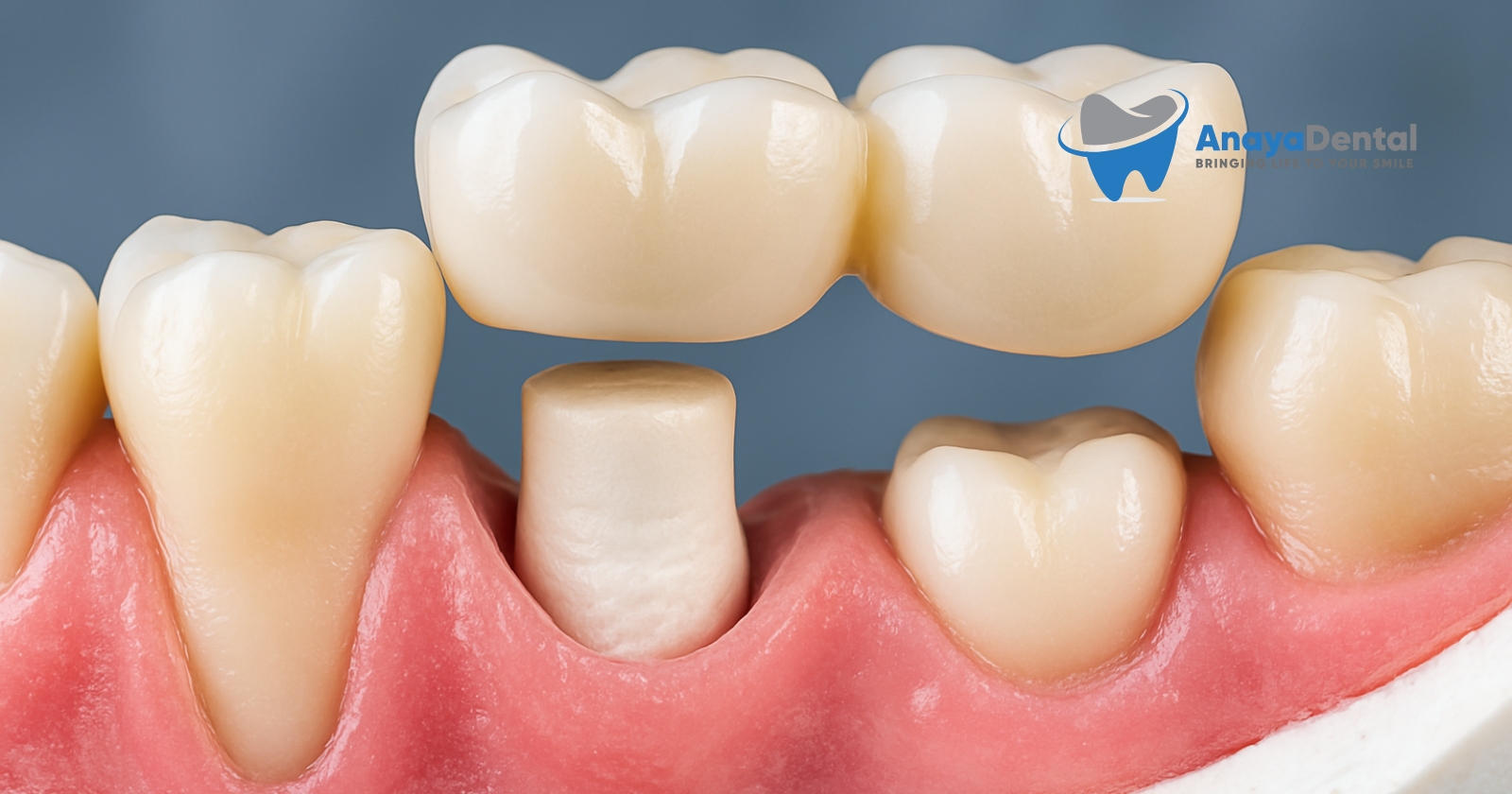Are you considering dental restoration options that balance durability with visual appeal? The D6245 dental code might be central to your treatment plan and financial decisions. This code designates a specific type of dental crown that combines strength with aesthetic qualities that many patients prefer.
What Exactly Is the D6245 Dental Code?
The D6245 dental code represents a porcelain/ceramic crown procedure for an artificial tooth. More specifically, this code indicates a crown made entirely of porcelain or ceramic material that is used to restore a dental implant—not a natural tooth. This distinction matters significantly for both your treatment options and insurance coverage.
When your dentist uses code D6245, they’re referring to a restorative treatment that places a porcelain or ceramic crown on an implant abutment, creating a prosthetic tooth that closely resembles your natural teeth in both appearance and function.
Try Our Dental Calculators
The Clinical Implications of a D6245 Procedure
The Underlying Dental Implant System
Before discussing the D6245 crown itself, it’s important to understand that this restoration sits on top of a complete implant system that includes:
- A titanium implant post surgically placed in your jawbone
- An abutment that connects the implant to the crown
- The crown (code D6245) that functions as your visible tooth replacement
The Porcelain/Ceramic Crown Advantage
Porcelain and ceramic crowns coded under D6245 offer several clinical benefits:
- Superior aesthetics that mimic natural tooth enamel’s translucency and color
- Biocompatibility with gum tissue, reducing irritation compared to some metal options
- Durability sufficient for many placement locations, including visible front teeth
- Stain resistance to maintain appearance over time
Ceramic materials have evolved significantly, with newer options like zirconia and lithium disilicate providing improved strength while maintaining excellent aesthetics. These advanced ceramics have made all-ceramic crowns suitable for nearly all positions in the mouth, though your dentist will recommend specific materials based on your needs.
How D6245 Differs From Other Crown Codes
Understanding the difference between D6245 and similar codes helps you make informed decisions about your dental care:
| Dental Code | Description | Key Difference From D6245 |
|---|---|---|
| D2740 | Porcelain/ceramic crown for natural tooth | Applied to natural tooth, not implant |
| D6058 | Porcelain/ceramic crown for abutment | Used for specific prefabricated abutments |
| D6060 | Porcelain fused to metal crown for implant | Contains metal substructure under porcelain |
| D6065 | Implant-supported porcelain/ceramic crown | Similar but used in specific implant systems |
The distinction between these codes affects not only the procedure itself but also how insurance companies process and cover the treatment.
Typical Costs Associated With D6245 Procedures
The financial aspect of a D6245 procedure involves consideration of both the crown itself and the supporting components:
The All-Inclusive Cost Range
A complete implant restoration including the D6245 crown typically costs between $3,000 and $5,000 per tooth. This price generally includes:
- The crown itself ($1,000-$2,500)
- The abutment ($300-$500)
- The implant placement (separate procedure code, $1,500-$2,500)
Geographic Cost Variation
Your location significantly impacts the cost of D6245 procedures:
- Urban centers typically charge 15-30% more than rural areas
- Coastal cities often have the highest fees nationwide
- Midwest and Southern regions frequently offer more competitive pricing
Additional Factors Affecting Price
Several factors might increase or decrease your final cost:
- Dental practice overhead costs
- Laboratory quality and materials used
- Dentist’s experience and specialization
- Need for additional procedures (bone grafting, tissue modification)
Insurance Coverage for D6245 Dental Procedures
Typical Coverage Scenarios
Insurance coverage for D6245 varies widely between plans:
- Basic dental plans often classify implant crowns as cosmetic, providing minimal or no coverage
- Mid-tier plans might cover 20-50% of the cost after deductibles
- Premium dental plans may cover up to 50-70% of implant crown procedures
According to the American Dental Association, only about 23% of dental insurance plans provide substantial coverage for implant-supported restorations, including D6245 crowns.
Understanding Coverage Limitations
Most insurance plans that do cover D6245 procedures impose significant limitations:
- Annual maximums typically ranging from $1,000 to $1,500
- Waiting periods of 6-12 months before coverage begins
- Frequency limitations (often only covering replacement every 5-7 years)
- Pre-existing condition clauses that may limit coverage
Pre-Authorization Requirements
Nearly all insurance providers require pre-authorization for D6245 procedures. This process typically involves:
- Submission of clinical findings and treatment plan
- Radiographic evidence of the implant
- Documentation of medical necessity
- Cost estimates and procedure codes
Alternative Payment Options for D6245 Procedures
Dental Discount Plans
Dental discount plans can reduce D6245 costs by 20-50% through pre-negotiated rates. Unlike insurance, these plans:
- Have no annual maximums
- Take effect immediately with no waiting periods
- Require a membership fee rather than monthly premiums
In-House Financing Options
Many dental practices offer payment plans specifically for higher-cost procedures like D6245 crowns:
- Typically involve 3-24 month payment periods
- May offer interest-free options for qualified patients
- Often require minimal credit checks
Third-Party Healthcare Financing
Companies like CareCredit, LendingClub, and Wells Fargo Health Advantage specialize in financing dental procedures:
- Extended payment terms (12-60 months)
- Interest rates varying from 0% promotional to 26.99% based on credit
- Approval processes typically completed within minutes
Health Savings Accounts (HSAs) and Flexible Spending Accounts (FSAs)
These tax-advantaged accounts can be used for D6245 procedures:
- Use pre-tax dollars for qualified dental expenses
- HSAs allow funds to roll over year to year
- FSAs typically require use of funds within the calendar year
Longevity and Maintenance of D6245 Restorations
Expected Lifespan
With proper care, D6245 porcelain/ceramic crowns typically last:
- 10-15 years for standard ceramic materials
- 15-20+ years for high-strength ceramics like zirconia
A 2018 study published in the Journal of Prosthodontic Research found that implant-supported ceramic crowns had a 94.4% survival rate after 10 years.
Maintenance Requirements
To maximize the lifespan of your D6245 restoration:
- Regular professional cleanings every 6 months
- Daily flossing around the implant crown using specialized floss or water flossers
- Avoiding excessive biting forces (no ice chewing, nail biting, etc.)
- Using a night guard if you grind your teeth
Potential Complications and Costs
Potential issues with D6245 restorations include:
| Complication | Approximate Repair Cost | Prevention Method |
|---|---|---|
| Crown fracture | $1,000-$2,500 for replacement | Avoid hard foods, wear night guard |
| Screw loosening | $150-$300 for tightening | Regular dental check-ups |
| Abutment failure | $500-$1,000 for replacement | Proper bite adjustment |
| Soft tissue inflammation | $100-$300 for treatment | Diligent oral hygiene |
Making Your Decision About D6245 Procedures
Questions to Ask Your Dentist
Before proceeding with a D6245 restoration, consider asking:
- “What ceramic material do you recommend for my specific situation?”
- “How many of these restorations have you placed, and what is your success rate?”
- “What alternatives might work for my case, and how do they compare in cost and longevity?”
- “Can you provide before/after photos of similar cases?”
Getting a Second Opinion
For significant investments like D6245 procedures, consider:
- Consulting another provider for alternative recommendations
- Requesting detailed treatment plans from multiple practitioners
- Comparing material recommendations and associated costs
Timing Considerations for Maximum Insurance Benefits
If you have insurance coverage:
- Consider treatment near the end of a calendar year and extending into the next to utilize two years of benefits
- Complete any required preliminary procedures during waiting periods
- Ensure all pre-authorizations are obtained before treatment begins
Quick Review
The D6245 dental code represents a porcelain/ceramic crown restoration specifically for dental implants. These restorations typically cost between $3,000-$5,000 for the complete procedure, with insurance coverage varying widely but often limited. Alternatives to immediate full payment include dental discount plans, payment plans, healthcare financing, and tax-advantaged health accounts.
With proper care, a D6245 restoration can last 10-20+ years depending on the specific ceramic material used. Working closely with your dental provider to understand all aspects of the procedure, materials, and financial options will help you make the most informed decision for your oral health and budget.
Remember that while the initial investment may seem substantial, the long-term benefits of durable, aesthetic implant restorations often justify the cost when compared to alternatives that might require more frequent replacement or compromise appearance.


